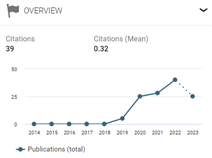Analisis partisipasi ibu balita dalam pemanfaatan Posyandu di wilayah Puskesmas Kota Banda Aceh
DOI: 10.30867/gikes.v1i2.414Abstract
Background: Public participation generally seen as a form of health behavior is the participation of mothers of children under five in the of Maternal & Child Health Centre it program. Its is a form of integrated services organized for and by the community with work programs from related agencies to then obtain basic health services, decrease maternal and child mortality rates and for the achievement of Small Prosperous Happy Families (KKBS).
Purpose: The study aims to analyze the coverage of weighing children under five to Maternal & Child Health Centre (D/S) in the area of the Banda Aceh City Health Center.
Method: This research is a qualitative study with a descriptive approach conducted with a Focus Group Discussion (FGD) of 3 main informants, 4 implementing informants and 7 policy makers in the lowest D / S region (Lampaseh Puskesmas area) and 3 main informants, 4 implementing informants and 8 informants policy makers in the highest D/S region (Kopelma Darussalam Puskesmas area).
Results: The results of this study found that the availability of facilities is still limited, the role of cadres is still low (not yet able to carry out development programs), the role of the gampong government is still lacking in supporting the implementation and improvement of posyandu visits, policy makers do not fully understand that the conditions in posyandu are a big responsibility from the village, and in practice in the field there has not been an effort to monitor and evaluate the extent of the implementation of the posyandu by the health department.
Conclusion: The cadres' low knowledge of development programs in an effort to increase community motivation for posyandu visits. Suggestions for implementing of Maternal & Child Health Centre activities to provide an understanding of how to implement a Maternal & Child Health Centre, improve competence, provide suggestions for development programs and for policymakers.
Keywords
Full Text:
PDFReferences
Adriana, D. (2011). Tumbuh kembang dan terapi bermain pada anak. Jakarta: Salemba Medika.
Al Rahmad, A. H. (2018). Modul pendamping KMS sebagai sarana ibu untuk memantau pertumbuhan balita. AcTion: Aceh Nutrition Journal, 3(1), 42-47.
BPS. (2013). Survei Demografi dan Kesehatan Indonesia (SDKI) 2012. Jakarta: Badan Pusat Statistik, 44, 122.
BPS. (2018). Survei Demografi dan Kesehatan Indonesia (SDKI) 2017. Jakarta: Badan Pusat Statistik, 44, 122.
Bungin, B. (2011). Penelitian Kualitatif HM.
Dinkes Kota Banda Aceh. (2018). Profil Kesehatan Kota Banda Aceh Tahun 2017. Banda Aceh: Indonesia.
Estuty, D. H. (2014). Partisipasi Masyarakat dalam Layanan Posyandu Terhadap Pertumbuhan Balita (di Desa Mergowati Kecamatan Kedu Kabupaten Temanggung). BELIA: Early Childhood Education Papers, 3(2).
Fadjri, T. K. (2016). Kualitas Hasil Penimbangan Berat Badan Balita oleh Kader Posyandu. AcTion: Aceh Nutrition Journal, 1(2), 111-115.
Hidayat, A., & Aziz. (2009). Pengantar Ilmu Keperawatan Anak 1. Salemba Medika
Ismawati, C., Proverawati, A., & Pebriyanti, S. (2010). Posyandu dan desa siaga. Nuha Medika: Yogyakarta.
Marimbi, H. (2010). Tumbuh kembang, status gizi, dan imunisasi dasar pada balita. Yogyakarta: Nuha Medika, 26-27.
Permendes. (2018). Peraturan Menteri Desa, Pembangunan Daerah Tertinggal dan Transmigrasi RI Nomor 16 Tahun 2018 Tentang Prioritas Penggunaan Dana Desa Tahun 2019.
Sugiyono, M. P. K. (2015). Kualitatif Kuantitatif. Bandung: Alfabeta.
Sulistyorini, C. I., Pebriyanti, S., & Proverawati, A. (2010). Posyandu (Pos Pelayanan Terpadu) dan Desa Siaga. Yogyakarta: Nuha Medika, 3-6.
UNICEF. (2019). UNICEF: Angka kematian bayi masih tinggi. Unicef.
WHO. (2003). Global strategy for infant and young child feeding. World Health Organization.
WHO. (2004). Complementary feeding counselling: a training course.
Wilis, R., & Al Rahmad, A. H. (2018). Penggunaan Modul Pendamping Kms Terhadap Ketepatan Kader Menginterpretasi Hasil Penimbangan. Jurnal Vokasi Kesehatan, 4(1), 12-18.
Refbacks
- There are currently no refbacks.













